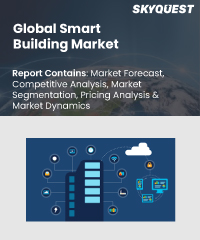
Product ID: SQMIG45H2056

Report ID:
SQMIG45H2056 |
Region:
Global |
Published Date: February, 2024
Pages:
157
|
Tables:
142 |
Figures:
77
North America dominated the global market in 2022, accounting for 33.3% of the total market share. The expanding governmental and private investments, as well as the developing digitization, can be contributed to regional growth.
Furthermore, numerous end-use segments in the United States are turning their present workplaces into smart offices. Because of increased expenditures in green building technologies, the United States dominated the regional market. For example, the Duke Energy Center in the United States, a 51-story tower skyscraper, obtained the highest green rating from LEED Platinum after implementing intelligent building infrastructure.
According to Schneider Electric's Smart Working study, commercial real estate in the United States consumes around USD 179 billion in energy each year. This aspect is projected to increase demand in the region for energy-efficient smart infrastructure.
Following North America, Europe is expected to account for a considerable market share. The increasing focus of European Union on deploying efficient energy-saving technology in residential and commercial buildings is predicted to propel the global market. By obtaining the WELL Building Standard certification, businesses in Europe are focusing on employee well-being and safety. As a result, the growing number of smart office buildings is expected to expand market prospects.
Due to the increased internet penetration, high urbanisation, and a shift in consumer focus toward remote management services via Internet of things (iot) Asia Pacific is predicted to be the fastest growing regional market at a notable CAGR. Moreover, shifting consumers’ attention toward converting existing buildings into smart buildings is boosting the regional market growth. Furthermore, the expanding population in China and India is likely to boost urban space management technologies. Additionally, expanding government initiatives to construct smart commercial spaces, retail malls, and neighbourhoods to cut energy usage is likely to support the market expansion.
The Middle East and Africa is witnessing a rapid expansion as a result of rising demand for energy-efficient smart building solutions. Furthermore, the government is working to cut carbon emissions by implementing smart technology to accomplish it.
Our industry expert will work with you to provide you with customized data in a short amount of time.
REQUEST FREE CUSTOMIZATIONSmart Building Market size was valued at USD 82.77 billion in 2019 and is poised to grow from USD 103.91 billion in 2023 to USD 538.45 billion by 2031, growing at a CAGR of 25.3% in the forecast period (2024-2031).
Want to customize this report? This report can be personalized according to your needs. Our analysts and industry experts will work directly with you to understand your requirements and provide you with customized data in a short amount of time. We offer $1000 worth of FREE customization at the time of purchase.

Product ID: SQMIG45H2056